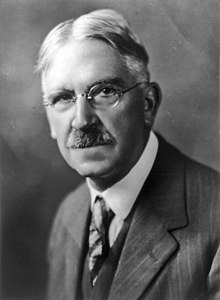ಜಾನ್ ಡೀವಿ
 | |
| ಜನನ | ೨೦ ಅಕ್ಟೋಬರ್ ೧೮೫೯ Burlington, Vermont, United States |
|---|---|
| ಮರಣ | June 1, 1952 (aged 92) New York City, New York, United States |
| ಕಾಲಮಾನ | 20th-century philosophy |
| ಪ್ರದೇಶ | Western philosophy |
| ಪರಂಪರೆ | Pragmatism Instrumentalism[೧] Functional psychology Process philosophy[೨][೩][೪] |
| ಮುಖ್ಯ ಹವ್ಯಾಸಗಳು | Philosophy of education, epistemology, journalism, ethics, aesthetics, political philosophy, metaphysics |
| ಅಧ್ಯಯನ ಮಾಡಿದ ಸಂಸ್ಥೆ | University of Vermont Johns Hopkins University |
| ಸಂಸ್ಥೆಗಳು | University of Michigan University of Chicago University of Chicago Laboratory Schools Columbia University |
| ಗಮನಾರ್ಹ ಚಿಂತನೆಗಳು | Reflective thinking[೫] Functional psychology American Association of University Professors Immediate empiricism Inquiry into Moscow show trials about Trotsky Educational progressivism Occupational psychosis |
ಜಾನ್ ಡೀವಿ ( / / ಯು ಐ / ; ಅಕ್ಟೋಬರ್ 20, 1859 - ಜೂನ್ 1, 1952) ಮಾಡಲಾಯಿತು ಅಮೆರಿಕಾದ ತತ್ತ್ವಜ್ಞಾನಿ, ಮನಶ್ಶಾಸ್ತ್ರಜ್ಞ, ಮತ್ತು ಶೈಕ್ಷಣಿಕ ಸುಧಾರಕ ಅವರ ಕಲ್ಪನೆಗಳು ಶಿಕ್ಷಣ ಮತ್ತು ಸಾಮಾಜಿಕ ಸುಧಾರಣೆ ಪ್ರಭಾವ ಹೊಂದಿದ. ಅವರು ಇಪ್ಪತ್ತನೇ ಶತಮಾನದ ಮೊದಲಾರ್ಧದಲ್ಲಿ ಅತ್ಯಂತ ಪ್ರಮುಖ ಅಮೇರಿಕನ್ ವಿದ್ವಾಂಸರಲ್ಲಿ ಒಬ್ಬರಾಗಿದ್ದರು. [೬] [೭]
ಡೀವಿಯವರ ಕೃತಿಗಳ ಪ್ರಮುಖ ವಿಷಯವೆಂದರೆ ಪ್ರಜಾಪ್ರಭುತ್ವದಲ್ಲಿ ಅವರ ಆಳವಾದ ನಂಬಿಕೆ, ಅದು ರಾಜಕೀಯ, ಶಿಕ್ಷಣ, ಅಥವಾ ಸಂವಹನ ಮತ್ತು ಪತ್ರಿಕೋದ್ಯಮ. [೮] ಮಿಚಿಗನ್ ವಿಶ್ವವಿದ್ಯಾನಿಲಯದಲ್ಲಿದ್ದಾಗ 1888 ರಲ್ಲಿ ಡೀವಿ ಸ್ವತಃ ಹೇಳಿದಂತೆ, "ಪ್ರಜಾಪ್ರಭುತ್ವ ಮತ್ತು ಮಾನವೀಯತೆಯ ಒಂದು, ಅಂತಿಮ, ನೈತಿಕ ಆದರ್ಶಗಳು ನನ್ನ ಮನಸ್ಸಿನಲ್ಲಿ ಸಮಾನಾರ್ಥಕವಾಗಿದೆ." [೯] ಪ್ರಾಯೋಗಿಕ ಬುದ್ಧಿಮತ್ತೆ ಮತ್ತು ಬಹುತ್ವವನ್ನು ಉತ್ತೇಜಿಸಲು ಗಮನ ಮತ್ತು ಪುನರ್ನಿರ್ಮಾಣದ ಅಗತ್ಯವಿರುವ ಎರಡು ಮೂಲಭೂತ ಅಂಶಗಳನ್ನು-ಶಾಲೆಗಳು ಮತ್ತು ನಾಗರಿಕ ಸಮಾಜವನ್ನು ಡೀವಿ ಪರಿಗಣಿಸಿದ್ದಾರೆ. ಸಂಪೂರ್ಣ ಪ್ರಜಾಪ್ರಭುತ್ವವನ್ನು ಕೇವಲ ಮತದಾನದ ಹಕ್ಕುಗಳನ್ನು ವಿಸ್ತರಿಸುವುದರ ಮೂಲಕ ಪಡೆಯಬೇಕು ಎಂದು ಅವರು ಪ್ರತಿಪಾದಿಸಿದರು, ಆದರೆ ನಾಗರಿಕರು, ತಜ್ಞರು ಮತ್ತು ರಾಜಕಾರಣಿಗಳ ನಡುವಿನ ಸಂವಹನದಿಂದ ಪೂರ್ಣವಾಗಿ ರೂಪುಗೊಂಡ ಸಾರ್ವಜನಿಕ ಅಭಿಪ್ರಾಯವಿದೆ ಎಂದು ಖಚಿತಪಡಿಸಿಕೊಳ್ಳುವುದರ ಮೂಲಕ, ಎರಡನೆಯವರು ಅವರು ಅನುಸರಿಸುವ ನೀತಿಗಳಿಗೆ ಜವಾಬ್ದಾರರಾಗಿರುತ್ತಾರೆ.
ವ್ಯಾವಹಾರಿಕತೆಯ ತತ್ತ್ವಶಾಸ್ತ್ರಕ್ಕೆ ಸಂಬಂಧಿಸಿದ ಪ್ರಾಥಮಿಕ ವ್ಯಕ್ತಿಗಳಲ್ಲಿ ಡೀವಿ ಒಬ್ಬರಾಗಿದ್ದರು ಮತ್ತು ಕ್ರಿಯಾತ್ಮಕ ಮನೋವಿಜ್ಞಾನದ ಪಿತಾಮಹರಲ್ಲಿ ಒಬ್ಬರು ಎಂದು ಪರಿಗಣಿಸಲಾಗಿದೆ. 1896 ರಲ್ಲಿ ಪ್ರಕಟವಾದ ಅವರ ಕಾಗದದ "ದಿ ರಿಫ್ಲೆಕ್ಸ್ ಆರ್ಕ್ ಕಾನ್ಸೆಪ್ಟ್ ಇನ್ ಸೈಕಾಲಜಿ", (ಚಿಕಾಗೋ) ಮನೋವಿಜ್ಞಾನದ ಫಂಕ್ಷನಲಿಸ್ಟ್ ಸ್ಕೂಲ್ನಲ್ಲಿ ಮೊದಲ ಪ್ರಮುಖ ಕೃತಿ ಎಂದು ಪರಿಗಣಿಸಲಾಗಿದೆ. [೧೦] [೧೧] ಎ ರಿವ್ಯೂ ಆಫ್ ಜನರಲ್ ಸೈಕಾಲಜಿ ಸಮೀಕ್ಷೆ, 2002 ರಲ್ಲಿ ಪ್ರಕಟವಾಯಿತು, ಡೀವಿಯನ್ನು 20 ನೇ ಶತಮಾನದ 93 ನೇ-ಹೆಚ್ಚು-ಉಲ್ಲೇಖಿತ ಮನಶ್ಶಾಸ್ತ್ರಜ್ಞ ಎಂದು ಶ್ರೇಣೀಕರಿಸಲಾಗಿದೆ. [೧೨]
ಡೀವಿ 20ನೇ ಶತಮಾನದ ಪ್ರಮುಖ ಶೈಕ್ಷಣಿಕ ಸುಧಾರಕರೂ ಆಗಿದ್ದರು. [೬] ಪ್ರಸಿದ್ಧ ಸಾರ್ವಜನಿಕ ಬುದ್ಧಿಜೀವಿ, ಅವರು ಪ್ರಗತಿಶೀಲ ಶಿಕ್ಷಣ ಮತ್ತು ಉದಾರವಾದದ ಪ್ರಮುಖ ಧ್ವನಿಯಾಗಿದ್ದರು. [೧೩] [೧೪] ಚಿಕಾಗೋ ವಿಶ್ವವಿದ್ಯಾನಿಲಯದಲ್ಲಿ ಪ್ರಾಧ್ಯಾಪಕರಾಗಿದ್ದಾಗ, ಅವರು ಚಿಕಾಗೋ ವಿಶ್ವವಿದ್ಯಾಲಯದ ಪ್ರಯೋಗಾಲಯ ಶಾಲೆಗಳನ್ನು ಸ್ಥಾಪಿಸಿದರು, ಅಲ್ಲಿ ಅವರು ಶಿಕ್ಷಣ ವಿಧಾನದಲ್ಲಿ ತಮ್ಮ ಪ್ರಗತಿಪರ ಆಲೋಚನೆಗಳನ್ನು ಅನ್ವಯಿಸಲು ಮತ್ತು ಪರೀಕ್ಷಿಸಲು ಸಾಧ್ಯವಾಯಿತು. [೧೫] [೧೬] ಡೀವಿಯವರು ಶಿಕ್ಷಣದ ಕುರಿತಾದ ಅವರ ಪ್ರಕಟಣೆಗಳಿಗೆ ಹೆಚ್ಚು ಹೆಸರುವಾಸಿಯಾಗಿದ್ದರೂ, ಅವರು ಜ್ಞಾನಶಾಸ್ತ್ರ, ಆಧ್ಯಾತ್ಮಿಕತೆ, ಸೌಂದರ್ಯಶಾಸ್ತ್ರ, ಕಲೆ, ತರ್ಕಶಾಸ್ತ್ರ, ಸಾಮಾಜಿಕ ಸಿದ್ಧಾಂತ ಮತ್ತು ನೀತಿಶಾಸ್ತ್ರ ಸೇರಿದಂತೆ ಹಲವು ವಿಷಯಗಳ ಬಗ್ಗೆ ಬರೆದಿದ್ದಾರೆ.
ಉಲ್ಲೇಖಗಳು[ಬದಲಾಯಿಸಿ]
- ↑ ಉಲ್ಲೇಖ ದೋಷ: Invalid
<ref>tag; no text was provided for refs namedIEP - ↑ https://plato.stanford.edu/entries/process-philosophy/
- ↑ https://iep.utm.edu/dewey/
- ↑ https://www.oxfordhandbooks.com/view/10.1093/oxfordhb/9780190491192.001.0001/oxfordhb-9780190491192-e-3
- ↑ John Dewey, How we think (1910), p. 9.
- ↑ ೬.೦ ೬.೧ "PBS Online: Only A Teacher: Schoolhouse Pioneers". www.pbs.org. Retrieved 2019-08-29.
- ↑ Hildebrand, David (2018), Zalta, Edward N. (ed.), "John Dewey", The Stanford Encyclopedia of Philosophy (Winter 2018 ed.), Metaphysics Research Lab, Stanford University, retrieved 2019-08-29
- ↑ Festenstein, Matthew (2018), Zalta, Edward N. (ed.), "Dewey's Political Philosophy", The Stanford Encyclopedia of Philosophy (Fall 2018 ed.), Metaphysics Research Lab, Stanford University, retrieved 2019-08-29
- ↑ Early Works, 1:128 (Southern Illinois University Press) op cited in Douglas R. Anderson, AAR, The Journal of the American Academy of Religion, Vol. 61, No. 2 (1993), p. 383
- ↑ "John Dewey". psychology.jrank.org (in ಇಂಗ್ಲಿಷ್). Retrieved 2019-08-29.
- ↑ Backe, Andrew (1999). "Dewey and the Reflex Arc: The Limits of James's Influence". Transactions of the Charles S. Peirce Society. 35 (2): 312–326. ISSN 0009-1774. JSTOR 40320763.
- ↑ Haggbloom, Steven J.; Warnick, Renee; Warnick, Jason E.; Jones, Vinessa K.; Yarbrough, Gary L.; Russell, Tenea M.; Borecky, Chris M.; McGahhey, Reagan; Powell, John L., III (2002). "The 100 most eminent psychologists of the 20th century". Review of General Psychology. 6 (2): 139–52. doi:10.1037/1089-2680.6.2.139.
{{cite journal}}: CS1 maint: multiple names: authors list (link) - ↑ Alan Ryan, John Dewey and the High Tide of American Liberalism, (1995), p. 32
- ↑ Violas, Paul C.; Tozer, Steven; Senese, Guy B. (September 2004). School and Society: Historical and Contemporary Perspectives. McGraw-Hill Humanities/Social Sciences/Languages. p. 121. ISBN 978-0-07-298556-6.
- ↑ "John Dewey's Laboratory School in Chicago". www.mi-knoll.de. Archived from the original on 2021-11-23. Retrieved 2019-08-29.
- ↑ "John Dewey (1859—1952)". The University of Tennessee at Martin.
